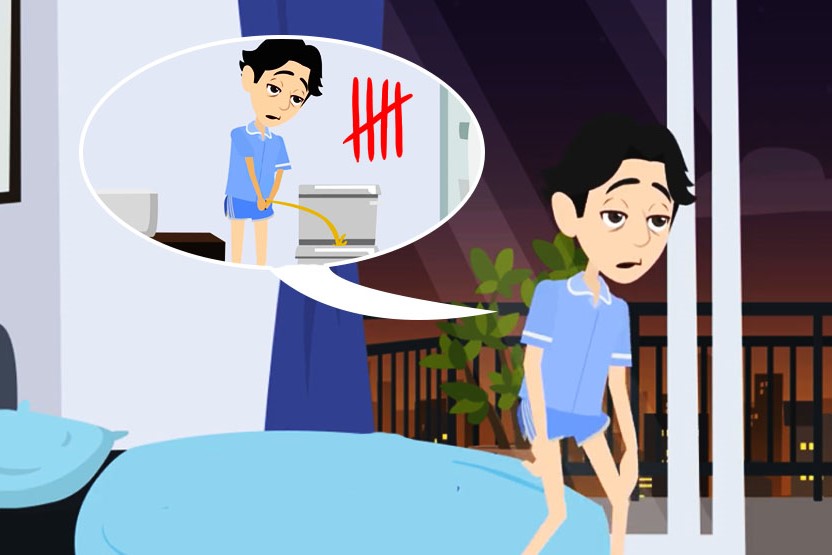
Nocturia: symptoms, causes and diagnosis
Nocturia is a medical term that refers to the need to interrupt sleep to get up and urinate during the night two or more times
The occurrence of this annoying disorder could be an alarm bell of various pathologies, but it could also result from taking medication and from non-pathological causes.
Most of the time, the pathological causes that trigger nocturia episodes can be traced back to temporary or systemic urinary pathologies.
Nocturia: the causes
The pathological causes that can provoke this disorder may be the following :
- Diabetes Mellitus or Diabetes Insipidus. Diabetes that has decompensated or is not well controlled can cause excessive thirst, which will consequently lead to nocturia and polyuria, while Diabetes Insipidus due to a lack of antidiuretic hormone leads to Nocturia and Polydipsia.
- Parkinson’s disease. This disease, which has become more common in the elderly, causes difficulty in voluntarily controlling the bladder and facilitates nocturia.
- Heart failure and heart failure. One of the very first bells of heart failure and Cardiac Insufficiency is nocturia, as during the course of the day there is an accumulation of liquids and salts that the body during the night tries to expel as excess liquids, thus causing nocturia.
- Cystitis: in this case, in addition to nocturia, pollakiuria also occurs and is most often caused by a bacterial process i.e. a urinary infection.
- Prostate gland problems. This disorder can be caused either by an inflammatory process of the prostate gland, called prostatitis. Prostatitis is now a recurring disorder in both young people and people up to the age of 60. It leads to an increase in the volume and weight of the prostate gland, called prostatic hypertrophy, which is very common in male patients over the age of 60. This disorder occurs because the patient is unable to empty his bladder completely and a post urination residue is thus created, which makes the interval between urinations shorter in time. There may also be other urological causes that facilitate nocturia such as sclerosis of the bladder neck or urethral stricture.
- Chronic renal failure: this disorder occurs in the early stages of the disease, with nocturia being replaced by oliguria and anuria as the disease progresses.
- Severe obesity and colitis: an obese patient may suffer from nocturia due to the pressure of internal organs on the bladder, while a colitic or irritable bowel patient may present this disorder accompanied by diarrhoea, flatulence and other digestive disorders.
Non-pathological causes of such discomfort may be the following :
- Pregnancy. Nocturia occurs in pregnant women in the last trimester when the volume of the uterus has almost doubled, as the uterus presses against the bladder, increasing the urge to urinate.
- Anxiety and stress. Subjects who present with states of anxiety may present with episodes of nocturia.
- Drug therapies. Patients who take diuretic drugs and therefore cause fluid elimination present episodes of nocturia.
- Nutrition. People who misuse stimulants containing caffeine, theine or consume a high protein diet during the day may present with nocturia episodes.
Nocturia, prevalence of the disorder
Moreover, we can say that nocturia is an absolutely normal and frequent phenomenon in men over 70 years of age.
However, a recent study conducted in America, on about 5000 men, over 20 years of age, found that this disorder does not only affect the elderly or pregnant women but one in five men must get up at least twice a night to empty the verscica and this means, as specified above, that various conditions, both pathological and non pathological, can cause nocturia.
Nocturia symptoms: when to go to the doctor
Whatever the cause, the effects of regularly interrupted sleep can also result in depression or reduced quality of life due to constant organic fatigue.
Therefore, when a patient, whether young or old, begins to present with nocturia episodes, it is a good idea to have a specialist urological examination, taking the main microbiological and diagnostic examinations.
Nocturia: the diagnostic examinations
- Urine examination with urine and abg;
- Vesico-prostatic ultrasound s.p. with post-mineral residual evaluation;
- Renal ultrasound;
- Uroflowmetry;
- Complete urodynamic examination if necessary.
Read Also:
Emergency Live Even More…Live: Download The New Free App Of Your Newspaper For IOS And Android
Kidney Stones: What They Are, How To Treat Them
What Is Albumin And Why Is The Test Performed To Quantify Blood Albumin Values?
What Is Cholesterol And Why Is It Tested To Quantify The Level Of (Total) Cholesterol In The Blood?
Gestational Diabetes, What It Is And How To Deal With It
What Is Amylase And Why Is The Test Performed To Measure The Amount Of Amylase In The Blood?
Adverse Drug Reactions: What They Are And How To Manage Adverse Effects
Kidney Stones: How They Form And How To Avoid Them
Renal Colic, How Does It Manifest Itself?
Biliary Colic: How To Recognise And Treat It
When The Patient Complains Of Pain In The Right Or Left Hip: Here Are The Related Pathologies
Organ Transport, The First European “Drone Ambulance” Debuts In Turin: It Will Transport Kidneys
What Is Pancreatitis And What Are The Symptoms?
Albumin Replacement In Patients With Severe Sepsis Or Septic Shock
Provocation Tests In Medicine: What Are They, What Are They For, How Do They Take Place?
What Are Cold Agglutinins And Why Is The Test Performed To Quantify Their Values In The Blood?
Creatinine, Detection In Blood And Urine Indicates Kidney Function


